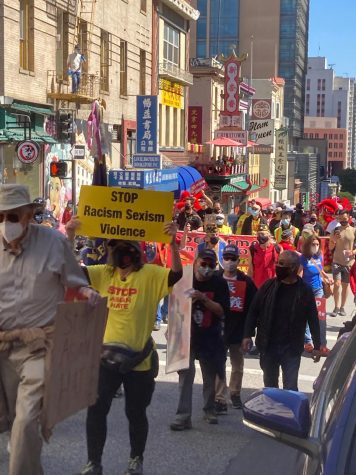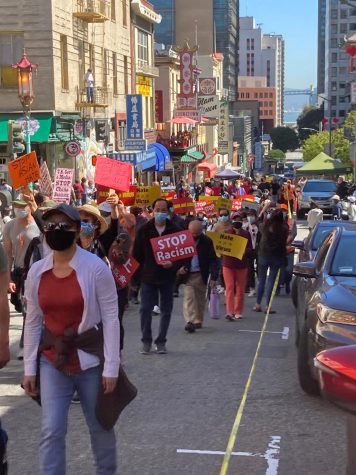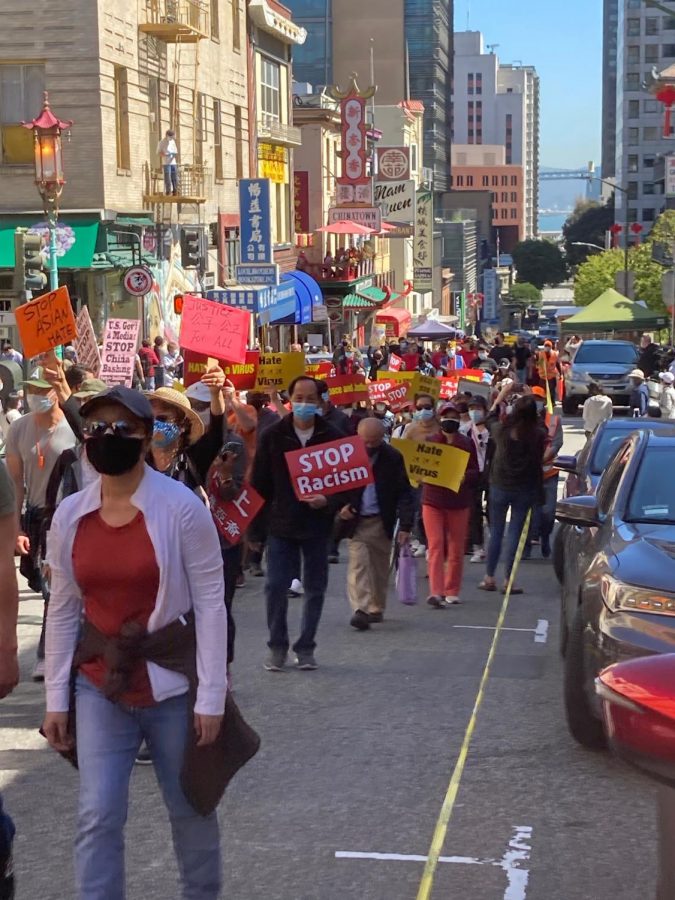Atlanta shootings simply revealed a longstanding truth


The shootings near Atlanta, Georgia which took place on March 16, 2021, and claimed eight lives, were a harsh reminder of the rise in anti-Asian sentiment within the United States. COVID-19 and the events that took place March 16 have simply propelled and further exposed the hate Asian Americans have learned to coexist with.
In the afternoon on March 16, gunman Robert Aaron Long shot a total of nine individuals in three separate locations. Long first began shooting at Young Asian’s Message Parlor in Acworth, Georgia around 4:50 pm EST, Delaina Ashley Yaun, Paul Andre Michels, Xiaojie Tan, and Daoyou Feng were all fatally shot, while Elcias R. Hernandez-Ortiz has just recently moved in stable condition as of March 30. An hour or so later, Long arrived at Gold Message Spa in Atlanta, twenty-seven miles away from the first shooting. Three were fatally shot at the Gold Message Spa and an additional body was found at Aromatherapy Spa located across the street. The four bodies were identified, the victims being Soon C. Park, Hyun J. Grant, Suncha Kim, and Yong A. Yue. The gunman now faces prosecution and is charged with eight counts of murder and one count of aggravated assault.
With a 1900% increase in hate crimes towards Asian Americans in New York alone and the 3,795 incidents of hate reported to stopaapihate.org from mid-March of 2020 to mid-February of 2021, the reactions towards this tragedy were mixed. “I was stunned. But not shocked,” said Cassie Eng ‘21, co-leader of the Asian and Pacific Islander (API) affinity space at Urban. “In keeping updated on themes and trends in the rise of anti-AAPI hate during this pandemic, a mass attack of some kind was predictable.”
To some, the event felt less like a surprise but rather more of something that was foreseeable in the upcoming months. However, accepting the implications of such a devastating event was harder to come to terms with. “The shock and fear I received from this news [the shooting] pushed me into a different reality, a much, much darker reality that I didn’t want to perceive,” said Linda Ye ‘24, member of Urban’s API affinity space.
Asian Americans have long been painted as the “model minority,” a theory that has often been used as an excuse for the racism Asian Americans have historically felt dating back to the moments like the Chinese Exclusion Act of 1882 and the internment of Japanese Americans during World War II. Yet these acts of neglect are not a thing of the past, “I don’t think most people know about Angelo Quinto (a vet who was kneeled on and killed by police), Vicha Ratanapakdee and Pak Ho (elders pushed on the street and passing away from their injuries) or Christian Hall (a teenager shot by police during a mental health crisis). Their stories didn’t get primetime news coverage,” said Eng.
“What made the shooting in Atlanta crucial was that it finally pushed people over the edge…this was a tragedy so big that it rocked the nation. It released a floodgate of emotions that had been building up all this time, most notably grief and anger,” said Eng. Congress held its first meeting to address anti-Asian hate in 30 years following the shooting in Georgia. “The big cable news sites and their headlining reporters are giving updates about it, late-night hosts reacting to the event in their monologues, and non-AAPI (but specifically white people) are posting about it. At Urban, we finally see an official statement come out on behalf of the school that was not written by API co-leaders. That made it truly sink in.” Eng added.
While much of the coverage of recent events has, in fact, helped bring attention to the hurt and pain of the API community, some uses of social media have been less effective. To prevent performative activism on social media, Eng said, “I want to push people to constantly reflect on themselves as they navigate social media. Before you post anything, you should think about why you are doing it. What do you hope the impact will be? What was its impact on you? What emotions are driving you to repost something? Which sources are you trying to highlight? Did you actually read it all the way through? Is this post all you are doing? How are you taking this new knowledge and applying it to how you live your life off-screen?”
President Joe Biden has since condemned racism and discrimination towards Asian Americans, however, some implore him to do more. “I want to see national policies on hate crimes, labeling such acts of violence as hate crimes, and setting up resources to gain counseling to help with the trauma. I want policies that allow for schools to gain resources to teach ethnic studies and more AAPI history, set up anti-bullying programs…and support affinity spaces,” said Eng.
President Biden should continue to confront acts of racism by addressing “the things that have promoted anti-Asian sentiment, such as when former President Donald Trump frequently associated the novel coronavirus with Asians,” said Ye.
Though Atlanta, Georgia sits around 2,500 miles away from San Francisco, the city and the Bay Area are not exempt from racist actions. According to the United States Census in 2019, it was reported that 36% of San Francisco’s population identified as Asian. “San Francisco is a place of diversity, you’ve got people coming from all sorts of backgrounds and that’s what makes this city so beautiful but also yet so conflicting,” said Ye.
At the beginning of the pandemic, “I held onto the belief that San Francisco, the Bay Area, and California were different. We are blue. This is my home. We are all good,” said Eng. “But over 12 months have passed, and now, I even expect the hate incidents on my feed to be in the Bay Area. San Francisco is extremely discriminatory…housing alone already highlights how inequitable the city is.”
It is imperative that the Urban community continues to support, rally around and most importantly learn from recent events and continue to ask questions and “do your own research,” Eng said. “If someone calls you out, know that holding someone accountable is an act of love. They called you out because they want you to grow. Don’t get defensive. Don’t make excuses. It wasn’t just a joke. If you hurt someone, own it, apologize, educate yourself.”
A next step to combating racism and white supremacy includes “being an ally, empathizing and standing together with the community being attacked. It’s really when someone uses their voice and their privilege to help others,” said Ye. “One way someone who doesn’t identify as Asian could connect with Asian identifying persons is by listening. Listening to their thoughts, their worries, their fears, and being there to support and help all move forward.”
While Asian Americans appear at the forefront of this latest surge of anti-racism that “doesn’t mean that the systemic violence against Black people at the hands of police, dehumanization of migrants and children at the border, erasure of indigenous people, microaggressions towards people of color, and more atrocities that I can’t even begin to name [don’t] still exist,” Eng said. “Show up for us and for other BIPOC. You can’t choose to fight for only one group. Recognize all forms of discrimination stem from white supremacy.”


